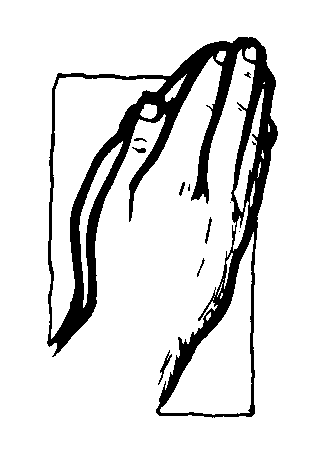




Prayer
This is the confidence we have in approaching God: that if we ask anything according to his will he hears us. And if we know that he hears us - whatever we ask - we know that we have what we asked of him.
Prayer is a paradox. James tells us "You do not have, because you do not ask God," and John backs this up with the bold claim that if we ask according to God's will, "we know that we have what we asked of him." [James 4:2, 1 John 5:15] And yet, Jesus said "Your Father knows what you need before you ask him." [Matthew 6:8.]
Why, then, should we pray to an all-knowing, all-loving Father, who delights to give us "Every good and perfect gift"? [James 1:17]
Does prayer really do anything? If so, how? How, then, should we pray?
1. Prayer and Faith
Read Hebrews 11:1-6.
Faith gives substance to our hopes and certainty about things promised before we see them, because it rests on the faithfulness of the God who rewards those who earnestly seek him. Clearly, it is closely related to prayer.
- First, we must clarify what faith is. Examine Romans 4:4-5, 18-22 and 10:11, 16 and 17. Compare Hebrews 11:1 and 6, then make a list of what one does when he exercises faith. What is the result? How, then, would you define "faith"?
- In the light of "anyone who comes to him" [Hebrews 11:6], how does prayer relate to faith?
- In the fight of Isaiah 59:1-4, sin cuts us off from approaching God. Read Hebrews 9:6-10 and l1:19-22. How can we become free to approach God? [Hint: see 1 John 1:5-9]
- Read the warning in Deuteronomy 8:10-20. Is it true that people tend to forget God when he blesses them? In this light, could it be that when we pray, most of what we are doing is surrendering our wills to God and admitting that it is he who fills all our needs?
- In light of the above, is it true that it is only when our rebellion and ingratitude are dealt with that God can safely bless us? Would this help resolve the paradox of God already knowing our needs and yet requiring us to ask him to fulfil them?
2. Prayer, Intimacy with God, and Listening to Him
The Bible's stress is not so much on asking God as on approaching him. Thus, the key to true prayer is intimacy with God, which means that we have to deal with the question of sin and how it affects our ability to communicate with him.
In turn, prayer is the key to the release of God's power in our lives, which frees us from sin and gives us the ability to walk in victory and serve him effectively.
- Prayer is a two-way street. Not only do we talk to God, but God reaches out to us, speaks to us and requires us to listen to and obey him [John 10:27]. What ere the ways that God talks to us? How can we make good use of them?
- Read 1 Corinthians 2:9-16, Romans 12:1-2, and 2 Timothy 3:14-17. What is the basic way that God speaks to us? In the light of Psalm 1 and Joshua 1:1-9, esp. 7-9, how should we work it into our prayer lives?
- If a person is willfully disobeying God about simple direct instructions in the Scriptures, can he reasonably expect God to reveal "advanced" things to him? How, then, should we set about learning to discern the voice of God?
- In the light of Hebrews 11:6, 1 John 5:14-15 and 2 Peter 1:2-4, how does praying in response to the known will of God help release the power of God in our lives?
- Read Matthew 26:36-46. In its light, how should we pray when we are uncertain about God's will and for fear that it may cut right across what we desire in a situation? Given the points made in James 1:5-8, should this uncertainty and/or fear be the norm for our prayer lives?
3. The ACTS of Prayer and the Power of the Name of Jesus
ACTS is a common mnemonic used to summarise the main types of prayer: Adoration (worship and praise), Confession (prayers in which we admit to God our guilt or our faith), Thanksgiving, and Supplication (prayers of request).
1. Read Matthew 6:9-13 and Psalm 95:1-7. How should we balance the different aspects of prayer? Is the order we see in these passages important?
2. Read John 14:5-14, esp. 6, 10 and 12-14 and compare Matthew 8:5-9. Given that "in the name of …" means "under (and with) the authority of …" what must we do to be able to supplicate God "in the name of Jesus"?
3. Contrast Acts 16:16-18 with Acts 19:13-17. Why was there so sharp a contrast in the results of these two appeals to the name of Jesus? In the light of John 14:12-14 and Acts 4:7-12, how should we apply this point to our lives?
4. The Ministry of Prayer
When it became necessary for the Jerusalem Church to set aside seven men to do poor relief, the apostles said: "We will turn this responsibility over to them and will give our attention to prayer and the ministry of the word." Prayer (along with the ministry of the word) has always been central to effective Christian service.
- Read Ephesians 1:13-23, which contains one of Paul's prayers for the churches in his care. Why did he pray for the Ephesians, and what did he request on their behalf?
- How would these blessings affect us today? Should we ask God to do the same things today? What would happen? (See Ephesians 3:16-21.)
- In the light of our findings, what specific steps should we take? When? How? Why?
Prayer, under (and with) the authority of Jesus, is powerful. It can release salvation, healing of the mind and body, liberation from satanic oppression and many other blessings: true prayer releases the power of God in our lives.
Brothers, let us pray.











